Hockey is back! Or it will be soon. The NHL has tentatively agreed to a return to play plan involving a 24-team playoff format but is still ironing out the details regarding dates and locations. This course of action has been lauded by droves of hockey-deprived fans but has piled more uncertainty on the 2020 NHL Entry Draft.
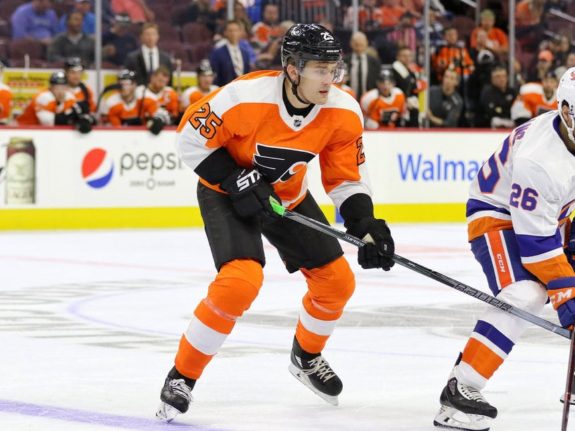
Given that the Flyers are a playoff team and look destined for a first-round bye, we know that many of the top prospects will be out of their grasp. I have already highlighted a few center prospects and, for this article, I have tried to steer clear of the top 10. Here are some wingers that the Flyers should target in the first round of this year’s draft.
Jack Quinn
2019-20 Team: Ottawa 67’s (OHL)
2019-20 Stats: 62 Games Played, 52 Goals, 37 Assists, 89 Points
Height: 6’0
Weight: 176 pounds
DOB: 09/19/01
Today’s NHL has gained an appreciation for two-way wingers and has a penchant for goal scorers. In Jack Quinn, a team can have both in one swoop. He plays a complete game, but if you ask virtually any scout about him, the first thing mentioned is always his shot. Quinn has a blistering wrist shot, a strong backhander, and the one-timer to match. He scored 52 goals in 62 games playing for a loaded Ottawa 67’s team this season but is far from just a triggerman.
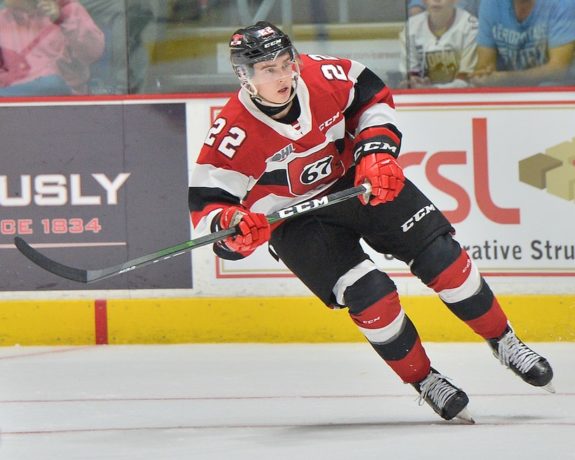
He uses his smooth stride to move the puck up the ice, seamlessly shifting to the center of the ice for high danger chances. His stickhandling is above average, and he can pull off slick moves at high speed. His willingness to backcheck paired with his hockey sense makes him effective defensively. He, in many ways, reminds me of Nino Niederreiter, but with Phil Kessel’s hard shot. He will make an ideal second-line winger. He may not last into the late first round, but if he starts to slide, Quinn is a player the Flyers should consider trading up for.
Jacob Perreault
2019-20 Team: Sarnia Sting (OHL)
2019-20 Stats: 57 Games Played, 39 Goals, 31 Assists, 70 Points
Height: 5’11
Weight: 192 pounds
DOB: 04/15/02
The overall depth of the 2020 Draft class will likely cause Perrault to slip to the early 20s but, make no mistake, he will represent excellent value there. His skillset has several plus elements, particularly on offense, which could translate to some nice production at the highest level. His most polished skills are his shot and his skating; his playmaking is solid as well.
Related: Top 10 NHL Lines
He performed well on the power play for his club this season, scoring 15 goals, ranked 2nd among draft-eligible OHL players, and 14 assists. His vision allowed him to make clever passes, but he was most effective in using his speed to create separation and as a finisher. The aspect of his game that needs the most work is his defense, where effort and consistency were issues. The Sarnia Sting were one of the worst teams in the OHL this year, especially on defense, but lackluster attempts will be a point of emphasis for him going forward.
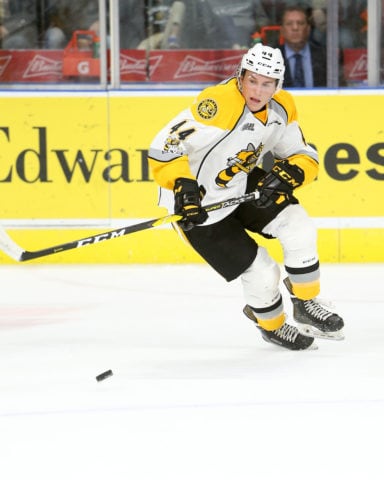
Perreault is another player from a hockey family, Jacob’s father played parts of 15 seasons in the NHL from 1993 to 2008. He doesn’t profile as the same kind of player as his father was, though Yanic was no slouch. To me, Jacob Perreault has a similar skill and style to the recently-retired Ales Hemsky, who could’ve reached greater heights had he not been hindered by shoulder and concussion issues.
Ozzy Wiesblatt
2019-20 Team: Prince Albert Raiders (WHL)
2019-20 Stats: 65 Games Played, 25 Goals, 45 Assists, 70 Points
Height: 5’10
Weight: 183 pounds
DOB: 03/09/02
A somewhat under-the-radar prospect, Ozzy Wiesblatt brings a nice combination of speed, offensive skills and defensive awareness to the table. His stride isn’t exactly a thing of beauty, but when you’re fast, you’re fast. He uses his speed to jam defensemen in the neutral zone, giving him that half-step advantage by the time he hits the blue line. Stickhandling, playmaking and shooting are also among his above-average qualities, all of which show up in his film. He has a good motor and gives strong effort on the backcheck, making for a very well rounded prospect.
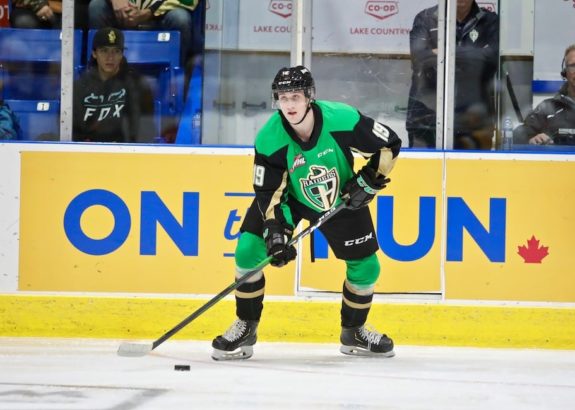
In many ways, he is a safe selection but also offers good potential. He has some desirable intangibles to go along with his skill set; he is a good leader and plays with a lot of fire. He has shown to be physical and will drop the gloves on occasion. He can play the role of agitator when needed. There are a few player comparisons that have been made for Wiesblatt, including Travis Konecny. The Konecny comparison is pretty spot-on, but I also see him as similar to Max Domi, though expecting 70+ points per year may be a bit of a stretch.
John-Jason Peterka
2019-20 Team: Munchen (DEL)
2019-20 Stats: 42 Games Played, 7 Goals, 4 Assists, 11 Points
Height: 5’11
Weight: 192 pounds
DOB: 01/14/02
One of the three prospects to emerge from the Deutsche Eishockey Liga this draft cycle, Peterka has a smooth stride, soft hands, and a high-energy style. His skating is fluid but what is more notable is that he is very strong on his skates and difficult to knock off of the puck. He has a decent shot, able to bury a quick one-timer and his playmaking is solid as well.
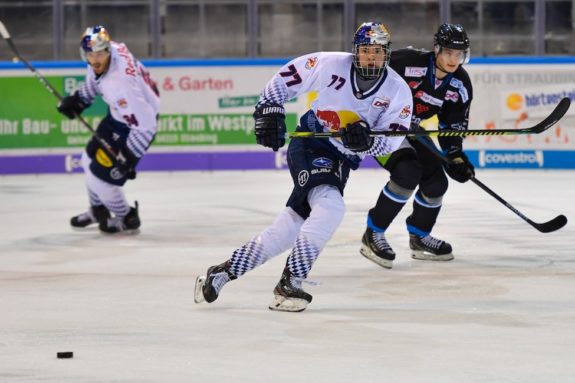
His first season in the DEL was an adjustment after coming over from the Czech U19 league, which could explain his seemingly pedestrian point totals, but his skills are there. His biggest flaw, as with many prospects, is his defense. He does put forth a good effort, but his defensive reads need work, and he looks, at times, a bit flustered trying to digest the play. This could also be chalked up to changing leagues this season, but at least the intention is there, which is something coaches can work with.
Related: 16 Active NHLers Destined for the HHOF
He may not be capable of carrying his own line, yet he could ride shotgun on several different ones. His play is similar to Jakub Vrana, with a strong center of balance, good hands, and some finishing ability.
Rodion Amirov
2019-20 Team(s): Ufa (KHL)/ Ufa 2 (VHL)
2019-20 Stats: 21 Games Played, 0 Goals, 2 Assists, 2 Points (KHL), 17 Games Played, 10 Goals, 12 Assists, 22 Points (VHL)
Height: 6’0
Weight: 177 pounds
DOB: 10/02/01
The Russian junior leagues are tricky for scouting players. There is a gap between them and North American developmental leagues, and it is difficult to say how large that gap really is. Prospects who graduate to the KHL during their draft year can remain wild cards due to the nature of the league; it’s a man’s league, the ice surface is larger than in North America, and scoring is low. Even with these variables in play, Rodion Amirov has caught many scouts’ eyes with his shifty skating, offensive instincts and well-rounded game.
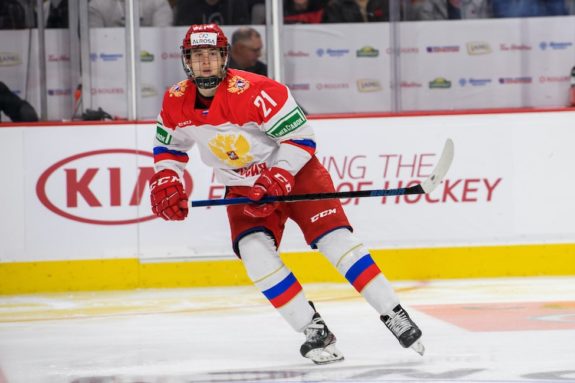
He played in the VHL, MHL and KHL this season, often looking like a man against boys at the lower levels before he hit a bit of a wall in the pros. He put himself on the map when he shined for Russia in the IIHF U18 World Championship in 2018-19, putting up nine points in seven games. His skating is good, but he is particularly crafty in his edgework, able to shake off defenders with quick cuts with the puck in the offensive zone. He is a creative passer, resembling, at times, a point guard in basketball breaking down a defender before setting up an open look. He possesses a hard, accurate shot but seems to opt for the pass more often.
Related: 4 Flyers Numbers That Need To Be Retired
Overall, his offense is versatile, so the goal-scoring potential exists for him at the highest level. He needs to work on his board play, an essential skill in North America, but this will likely improve as he gets stronger. A player comparison for Amirov should his game develop as expected would be in-his-prime Loui Eriksson, an equally competent passer and shooter capable of scoring 60 points a season.
Value to Be Had
The depth of this particular draft will inevitably lead to some players slipping a bit who would otherwise be selected higher. This could be especially true for the winger group, with several players with second-line upside projected to last beyond the teens. The Flyers could end up with some tremendous bang for their buck if any of the aforementioned players start to fall.